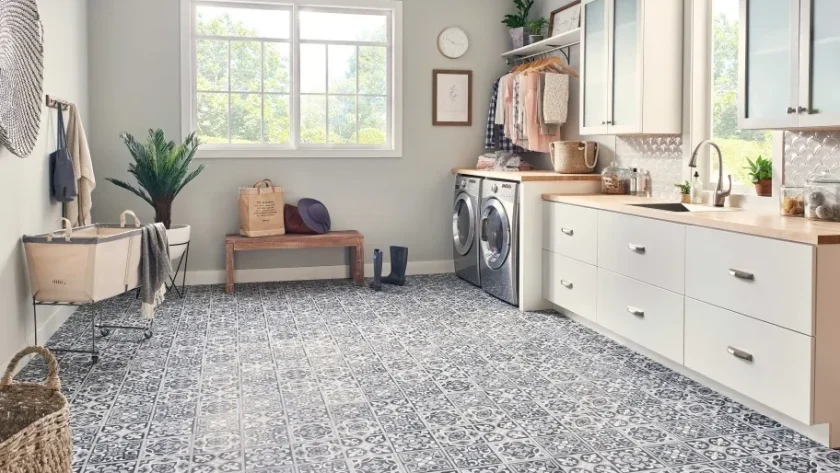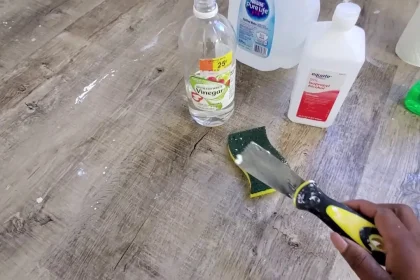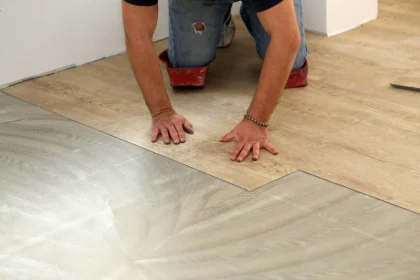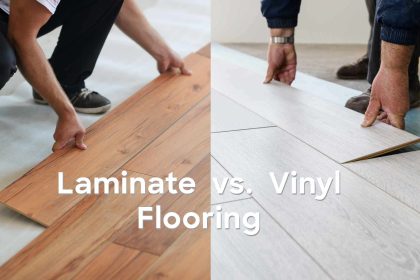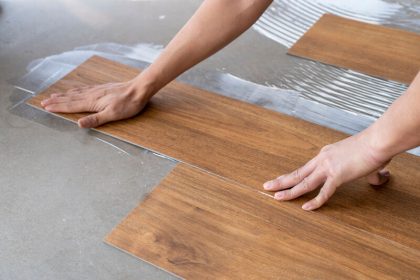Waterproof vinyl flooring has taken over the flooring industry, and for good reason. If you’re renovating your home or looking for a durable, stylish option that can handle everyday messes, it’s likely you’ve come across this trendy choice. But the big question remains—is waterproof vinyl flooring really worth it?
In this guide, we’ll walk you through everything you need to know about this type of flooring—its benefits, drawbacks, pricing, where it works best, and whether it’s the right fit for your home.
What Is Waterproof Vinyl Flooring?
Waterproof vinyl flooring is a type of synthetic flooring made to resist water penetration. It typically consists of multiple layers, including a wear layer, a vinyl core, and a backing layer. There are two major types: SPC vinyl flooring (Stone Plastic Composite) and WPC vinyl flooring (Wood Plastic Composite)—both engineered to offer superior moisture resistance and toughness.
The core difference between these types lies in density and feel. SPC is denser and firmer underfoot, while WPC feels softer and warmer, making it a more comfortable choice for living spaces.
Why It’s Popular: Key Benefits
1. Excellent Water Resistance
The most obvious advantage is in the name. Whether you’re installing it in bathrooms, kitchens, laundry rooms, or basements, waterproof vinyl flooring stands up well to moisture. It’s perfect for families with kids or pets where spills are a daily occurrence.
2. Durability That Lasts
With a built-in scratch-resistant wear layer, it handles foot traffic, toys, furniture movement, and pet claws quite well. Vinyl flooring durability is one of its strongest selling points, particularly in high-traffic areas.
3. Easy Installation with Click-Lock System
Many modern waterproof vinyl options come with click-lock installation or floating floor systems. These systems don’t require glue or nails, which makes it DIY-friendly and budget-effective. Plus, you can often lay it directly over existing flooring.
4. Stylish and Realistic Designs
Thanks to advancements in printing technology, vinyl flooring can mimic hardwood, stone, or tile with amazing realism. Whether you want oak, grey wood, or marble-look tiles, the vinyl flooring aesthetics are surprisingly impressive.
Where Waterproof Vinyl Flooring Works Best
Because of its moisture-resistant flooring design, it excels in wet zones like:
- Bathrooms: No worry about water seepage or swelling.
- Kitchens: Resists splashes and food spills.
- Basements: Handles humidity better than most floors.
- Entryways: Dirt, wet shoes, and puddles won’t ruin the surface.
- Pet Areas: It doubles up as pet-friendly flooring with easy clean-up.
What About Comfort and Sound?
Many WPC vinyl flooring options offer a softer feel underfoot, and some come with built-in underlayment that helps absorb sound and adds a little cushioning. For homes with kids or seniors, this adds comfort and safety.
If you choose SPC vinyl, it’s a bit firmer, but you can always add a separate underlayment for vinyl flooring to soften the impact and dampen noise.
How Does It Compare to Laminate Flooring?
A common question is how it stacks up against laminate. While laminate can be water-resistant, it’s not truly waterproof. Over time, water can still seep through the seams and cause warping or swelling. So, if you’re after complete water protection, waterproof vinyl flooring vs laminate leaves vinyl as the clear winner.
Cost Breakdown
One of the main concerns homeowners have is: how much does waterproof vinyl flooring cost per square foot?
Here’s a general idea:
- Budget options start around £15–£20 per m².
- Mid-range quality goes for about £25–£35 per m².
- Premium ranges (like luxury vinyl plank flooring) can reach £40–£50+ per m².
Keep in mind, DIY vinyl flooring installation can cut down labour costs significantly. However, for large or uneven spaces, hiring a pro ensures long-lasting results.
Maintenance: A Breeze
Cleaning is a big selling point. Just a sweep and occasional mop (with no harsh chemicals needed) keeps it looking fresh. Because it’s scratch-resistant flooring, there’s no need to refinish or wax it like traditional hardwood.
Also, many brands now offer a vinyl flooring warranty, sometimes ranging from 10 years up to a lifetime—just be sure to check the fine print.
Things to Watch Out For
Despite the many benefits, there are a few points to consider:
- Subfloor prep is crucial: Any bumps or unevenness beneath the vinyl can lead to problems over time.
- Heavy furniture can dent thinner options: Choosing vinyl with adequate vinyl flooring thickness helps avoid this.
- Colour fading in direct sunlight: Some vinyl products can fade if exposed to strong UV rays daily. Look for UV-resistant coatings.
- Not ideal for high heat: It’s not recommended for sunrooms or spaces with extreme heat.
Real-Life Example
A friend of mine renovated her kitchen using luxury vinyl plank flooring after dealing with water damage on her old laminate floors. She opted for a rigid core flooring type with a floating floor system, and she installed it herself over the weekend. It not only saved her on labour costs but also added a stylish wood-look finish. Two years later, it still holds up great despite her two energetic dogs.
Is It Worth the Investment?
If you’re looking for a flooring solution that blends functionality, waterproof protection, comfort, and design, waterproof vinyl flooring is definitely worth considering. It gives you the look of hardwood or tile without the price tag or maintenance hassle.
For families, pet owners, and anyone living in humid climates or flood-prone areas, it offers peace of mind and convenience that’s hard to beat.
❓ FAQ: Waterproof Vinyl Flooring
1. What is waterproof vinyl flooring made of?
Waterproof vinyl flooring is made of multiple layers including a wear layer, vinyl layer, waterproof core (usually SPC or WPC), and backing. This layered construction gives it durability, water resistance, and comfort underfoot.
2. Is waterproof vinyl flooring really waterproof?
Yes, it’s 100% waterproof. The core layer (SPC or WPC) does not absorb moisture, making it ideal for bathrooms, kitchens, basements, and other wet areas in the home.
3. How long does waterproof vinyl flooring last?
With proper care, waterproof vinyl flooring can last 10–20 years or more. Choosing thicker planks with a high-quality wear layer and a good warranty helps extend its lifespan.
4. Is waterproof vinyl better than laminate flooring?
Yes. While laminate is only water-resistant, waterproof vinyl flooring is fully waterproof, meaning it won’t swell or warp when exposed to moisture. It’s a better choice for wet areas.
5. Can I install waterproof vinyl flooring myself?
Absolutely. Many vinyl floors use a click-lock installation system, making them perfect for DIY projects. Just make sure your subfloor is level and clean before installation.
6. Does vinyl flooring need underlayment?
Some products come with built-in underlayment, especially rigid core vinyl. If not, adding a vinyl-compatible underlayment can improve sound insulation and comfort.
7. Is waterproof vinyl flooring good for pets?
Yes. It’s highly durable, scratch-resistant, easy to clean, and won’t be damaged by pet accidents—making it one of the most pet-friendly flooring options available.
8. How much does waterproof vinyl flooring cost in the UK?
On average, prices range from £15 to £50 per m² depending on quality, thickness, and brand. DIY installation can help reduce total project costs.
9. Can waterproof vinyl flooring be used on stairs?
Yes, but stairs may require glue-down vinyl planks instead of floating types. Always follow manufacturer guidelines to ensure safe and lasting installation.
10. Does waterproof vinyl flooring look like real wood or tile?
Yes. With advanced printing and embossing technology, modern vinyl flooring aesthetics can convincingly mimic natural wood, stone, or ceramic tile looks.
Conclusion
Waterproof vinyl flooring is more than just a trend—it’s a practical, cost-effective flooring solution that suits a wide range of homes and lifestyles. With options like WPC and SPC vinyl flooring, a variety of finishes, and easy click-lock installation, it’s a smart choice for modern living.
Before you commit, weigh the pros and cons, consider the room, and choose a product with the right wear layer, thickness, and warranty for your needs. Whether you’re outfitting a bathroom or giving your kitchen a new look, waterproof vinyl flooring can truly transform your space—without breaking the bank.

